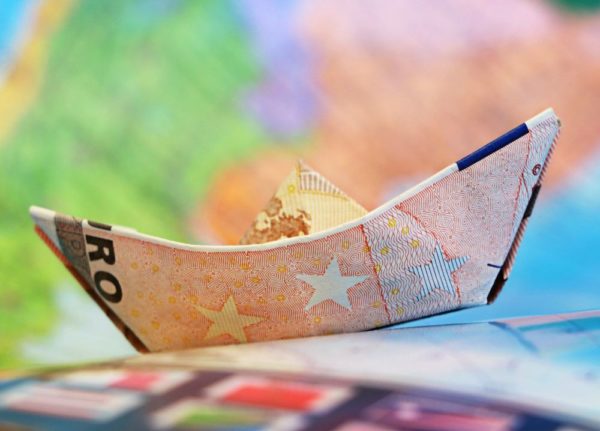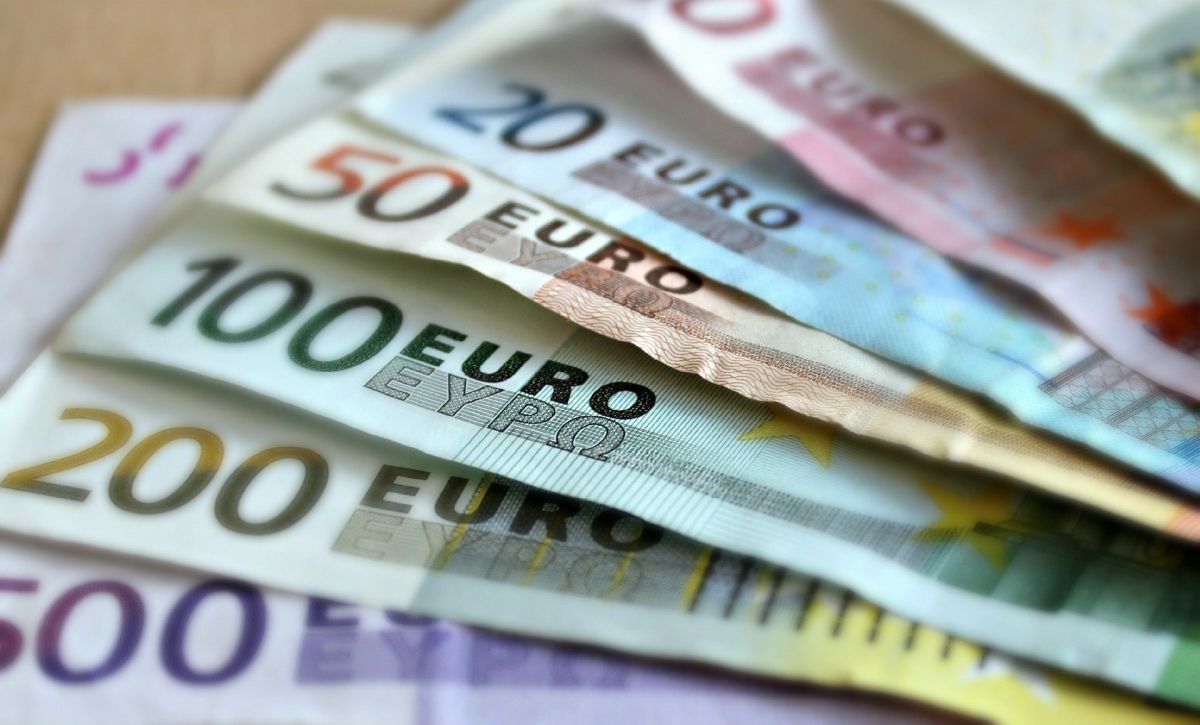There have always been talks about Romania switching to using Euros and today I will answer the burning question: When will Romania adopt the Euro?
Not all countries in the European Union are using the Euro – and Romania is one of them. Actually, EU’s currency is not used much in the country.
This is something that will definitely surprise many people. There are very few places in the country where you can pay with Euros. In those few places – usually touristy ones – the exchange rates will be very, very poor.
In other words, right now, your best bet and basically only option is that of exchanging your US Dollars or Euros into Lei aka the Romanian Leu, the national currency.
And you’ll still have to do that for some time starting now, because Romania doesn’t have any plans to switch to Euros anytime soon even though historically, every few years, officials claimed that the country is very close to finalizing the move.
When will Romania switch to Euro?

There is no official date set for Romania to adopt the Euro. Analysts, as well as the country’s Finance Minister claimed that Romania might be ready to switch to Euro in 2029 or 2030.
I find this really funny, because there have always been plans for adopting the Euro and the dates have always been pushed back when the deadline was close. There are various reasons for that, including:
– the very low wages and buying power of the Romanians and the Romanian Leu (currently, in February 2023, 1 Euro is 4.90 Lei, while in July 2020, it was 4.84 lei. When I initially wrote this article back in October 2017, 1 Euro was 4.7 lei)
– the fact that people are still confused about using single-digit currency. Most people still talk in hundreds of thousands and millions when referring to prices, even though 4 zeroes have been cut off the Lei’s tail to help with the transition (until several years ago, the 10 lei bill was 100,000 lei and the 100 lei bill was 1 million).
– the fact that Romania doesn’t meet the EU’s conditions for adopting the Euro.
At the moment of writing, the country doesn’t meet any of the four conditions, although several years ago they met as many as three out of four. Pretty interesting!
So… will Romania switch to Euro?

Original estimates were that in 2015, Romania will switch to using the Euro. Things have been pushed back to 2019, but recent talks have pushed back the date even further.
Back in 2017, the official date considered for Romania to switch to using EUROs was sometime in 2022, then in 2024. As you can see, dates keep being pushed forward.
Currently, there is no official date announced for Romanian to adopt the Euro (so the politicians have at least learned this lesson).
However, the current Finance Minister, Adrian Caciu, believes that 2029 is a date when the country might make the switch. (source: Adevarul, Romanian newspaper)
In 2018, the Romanian parliament actually came up with a plan to make the transition to the new currency.
This, after in 2017, the foreign minister of the country at the time was already claiming that the country meets all the requirements to adopt the Euro.
He said that the switch was delayed intentionally in order to protect the low-income people (especially the older folk who receive state pension – and it’s common for many to have pensions of under 100 Euros per month).
However, despite the official comments, the European Commission and European Central Bank had a different opinion and concluded, in late 2016, that Romania still doesn’t meet the criteria for joining the Euro zone. This hasn’t changed until today.
Romania’s central bank governor, Mugur Isarescu, claimed in 2020 that Romania will switch to Euro by the end of the decade. (Source here, in Romanian language).
I think that out of all the people who made claims, he’s the one we could trust the most. But I still doubt that, even by the end of the 2020s, Romania will be ready to make the switch.
In other words, if you’re planning a trip to Romania in the near future – or even a few years from now, you will most likely still have to use the current Leu currency and not the Euro.
Do Romanians want to switch to Euros?

Very few people understand the impact that adopting the Euro would have on their lives and more don’t really care.
It is, up to a point, very difficult to anticipate the full effects switching to euros would have on the country’s economy and its people, but most predict some difficult times if we were to switch to using Euros, at least at the current state/rates and income that people earn in the country.
With these in mind, the number of people who want Romania to switch to using Euros is dropping.
For example, in 2014, 74% of the Romanians wanted to switch to Euro, but the percentage dropped to 68% in 2015 and kept dropping all the way to 55% in late 2016. I wasn’t able to find more recent data.
This drop in ratings is probably a combination of people understanding the consequences of switching to using the Euro, but maybe also the rise in popularity of EU skeptics in Europe.
Also, Croatia recently switched to using the Euro and their prices have seen at least a temporary boost. While I don’t think many people in Romania know about this, it could still have at least a bit of an impact.
With all these in mind, I still believe that the 2029 estimate is optimistic to say the least.
I am sure that Romania will stick to using its Lei for a long time now and there will always be delays, unless the bigger players in the Union will have any reasons to force us adopting the Euro (which probably will never happen).
This means that those earning income in foreign currency will still have more to gain and a greater buying power in the country.
Also, if you are planning to visit, you should make sure to be ready to exchange your currency into the local one in an exchange office or bank in order to get the best rates.
What do you think, though? Should Romania switch to using Euros as quickly as possible or you prefer it as it is now?
- List of the International Airports in Romania (with Map) - April 25, 2024
- Beach, Please Festival 2024: Lineup, Schedule & Dates [Updated April 24] - April 24, 2024
- Best Music Festivals in Romania – with Dates & Lineups [2024 Update] - April 17, 2024


I can understand the peoples reluctance to switch to euros. I would be very wary if l lived in Romania too. Imagine someone getting 100 euro a month benefit like you say. What would they be able to do with that? It would totally suck. I remember when Italy switched a long time ago, my uncle was living there at the time and said it was traumatic as suddenly people couldn’t afford things that they could with the lira. Their benefit wasn’t for instance 4,000 lira to 4,000 euro, but to the conversion rate. It’s hard for me to explain :-). We love Romania and are sad our week has come to an end. How wonderful meeting you and the Mrs. We hope we get to come back soon. I can see why people would want to move here.
I know – it’s difficult to explain, but probably everybody understands how it all goes 🙂
I am happy that you enjoyed your stay in the country – it’s been a great pleasure meeting you and Federico! There is still a thing or two left unseen, so you can definitely schedule more trips here in the future 🙂
While some big ticket items, such as automobiles, are priced in Euros, I’m finding that for me, paying rent is the only transaction where I’m using Euros… and even then it’s an option for Lei. The difficulty I’m having with currency is managing all the different bank accounts. Aside from my accounts in the US, I’ve got three to watch over here in Romania. Lei, Euros and Dollars, all stashed in separate accounts, even though at one bank. I’m finding it’s a shell game trying to plan for living expenses and travel outside of Romania, all while watching for the optimal exchange rates in order to shuffle money around. I can see how, for me, the economy moving from Lei to Euros would simplify this back and forth, but I like how roughly four Lei equal one Dollar. This means figuring the price of an item on-the-fly is easy. The Euro, not so much. Believe me, I’m no mathematician.
Yeah, I am sure it’s difficult at first. Rounding up is the way to do it, although you do miss the exact price. Even the dollar is 3.90 lei right now… but with the Euro being 4.7, math is even more difficult. Especially in your case when you probably have to calculate USD to RON, then RON to EUR. Hopefully this will get easier over time 🙂
I am scratching my head because, in general, people on fixed incomes, pensioners for instance, like “hard” currencies because they don’t lose value due to inflation. Right now, I think the Leu is about 4.57 to the Euro. If Romanian pensioners are now getting the equivalent of 100 Euros, that means they are getting about 457 Leu per month. A week currency like the Leu will lose value, that means that 457 Leu a month will buy less and less as inflation increases the prices for housing, food, clothing, etc. Of course, the Romanian government gives these pensioners a cost-of-living increase in Leu too. The strength of having your own currency is that you can print more of your own currency and devalue it if you want. Portugal, Italy, Greece and Spain (“The PIGS,” yes I left out Ireland) all gave up their weak currencies for the Euro. Their populations were quite happy at the beginning, but soon massive trade deficits with Northern European countries made it impossible for these countries to keep paying their pensioners, and supporting generous welfare systems, without heavy borrowing in the Eurobond market. They could not print any Euros! We know what happened to Greece. It went over the debt precipice and had to be bailed out, causing much resentment in the Northern European countries. The right-wing populist movement in Germany got its start because of this bailout (later, that populist movement morphed into an anti-immigrant movement). Anyway, Spain, Portugal and Italy are still trying not to go under like Greece. Countries with weak non-Euro currencies like Poland, Czech Republic, Hungary, Slovakia and even Romania have not had to borrow heavily on the Eurobond market and are sitting pretty relative to the “PIGS.” In light of all this, I don’t see why the Romanian government, which, sorry to say , is every bit as incompetent as that of Greece, would want to take on the Euro. Likewise, I think the Euro countries like Germany are not going to let another “Greece” into the Euro-Zone. Besides, greedy expatriates (like me) from hard currency countries JUST LOVE countries with weak currencies like Mexico, the Philippines, and Romania because our dollars/euros buy more and more of these weak currencies as they devalue. So don’t do it!
I am sure they won’t do it – probably, talks must be held and estimated dates as well, which will keep being pushed back over and over again. Plus, there are, apparently, problems already with the lack of money for pensions and welfare (the latter being a ruin in which most people getting money have no disabilities, but paid doctors to declare them disabled). They already wanted to get their hands on the small private pensions, but public opinion made them change their mind. However, nobody knows what will happen when the knife will hit the bone…
Another problem when switching to Euros is that prices will increase and so will cost of living. People are greedy and they will take this advantage to try and increase their profits, making it even more difficult for those on fixed incomes from the country.
There are many reasons not to make the switch and I personally believe that it will be long before Romania switches to Euros.
Calin:
Can you explain why a lot of Romanian real estate transactions occur in Euros? I believe you said you bought your lovely house with Euros.
Is it that most real estate is owned or managed by non-Romanian entities? So confusing!
I’ve never bought real estate; I’ve only rented. So let’s say I’m très ignorant.;-)
Thanks!
~Teil (USA)
I think that the main reason why all prices are posted in Euros is because that’s the more stable currency. 1,000 lei could be 200 Euros today, but one year from now, they could be worth 180 Euros (as a rough example). There might be other reasons as well but I think that the exchange rate is the main one.
Well, its kinda rough Romania is kinda one of the poorest incomes in EU but in 2025 the city of Buchurest is expected to have a yearly income of 60.000$ and other cities and “Județe” with their “Comune” are somon going to follow so we might see the Euro being adapted somewhere around 2025-2027
Also i hope you enjoied your stay in Romania!